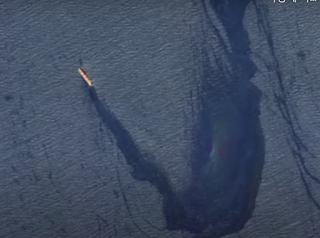Sinking Ship Spells Environmental Catastrophe in the Red Sea
Sinking Ship Spells Environmental Catastrophe in the Red Sea
Subtitle: The Rubimar Incident and the Urgent Call for Marine Protection
In a distressing turn of events, the Rubimar, a British-owned cargo ship, has become the focal point of an impending environmental disaster in the Gulf of Aden. Struck by a missile from pro-Iranian Houthi rebels, the vessel now threatens to unleash a toxic spill that could devastate the Red Sea's already vulnerable ecosystem.
Carrying a massive load of over 40,000 tons of chemical fertilizer, the Rubimar's potential sinking poses not just a navigational hazard but a dire ecological emergency. An oil slick roughly 29 kilometers wide encircling the vessel underscores the scale of the threat looming over the marine environment.
The incident, occurring amidst a tense backdrop of regional conflict, highlights the broader risks that maritime transport of hazardous materials poses to our oceans. The Rubimar, en route to Bulgaria from the United Arab Emirates, symbolizes the intricate web of global trade, environmental stewardship, and the unforeseen consequences of geopolitical strife.
As the ship takes on water, efforts to mitigate the crisis have kicked into gear. The Yemeni government, recognizing the magnitude of the potential disaster, is drawing up contingency plans. Meanwhile, the company operating the Rubimar has commenced tug operations, aiming to relocate the ship to either Djibouti or Aden ports in a bid to prevent the catastrophe.
Yet, the relentless attacks by Houthi rebels in the region, countered by US-led coalition airstrikes, add layers of complexity to the already challenging task of safeguarding the marine environment. These ongoing hostilities underscore the urgent need for international cooperation and comprehensive strategies to protect our oceans from the collateral damage of conflict.
For environmental activists and concerned citizens worldwide, the Rubimar incident serves as a stark reminder of the fragility of marine ecosystems and the need for vigilant stewardship. It calls for a reevaluation of the risks associated with transporting hazardous materials through conflict-prone waters and the imperative of prioritizing ecological integrity in the face of human-made crises.
As the situation unfolds, the global community must come together to address the immediate threat and work towards long-term solutions that ensure the safety of maritime routes and the preservation of our marine habitats. The fate of the Rubimar is not just a concern for those directly involved but a clarion call for all who value the health of our planet's oceans.
A cargo ship named the Rubimar, owned by Britain and registered in Belize, has been attacked by pro-Iranian Houthi rebels in the Gulf of Aden, leading to a significant environmental threat. The ship, which was transporting more than 40,000 tons of chemical fertilizer, is now sinking, causing a substantial oil slick approximately 29 kilometers in diameter around it. This incident raises alarms over the potential for a major environmental disaster in the Red Sea, given the area's fragile ecosystem and the hazardous nature of the cargo. The Rubimar was traveling from the United Arab Emirates to Bulgaria when it was targeted on April 19, resulting in the evacuation of its 24 crew members. In response to the imminent threat of sinking, the Yemeni government is formulating contingency plans, while the company operating the ship has initiated tug operations to possibly move it to Djibouti or Aden. Meanwhile, Houthi rebels continue their assaults in the region, and the US-led coalition is responding with airstrikes against them.
Frequently Asked Questions (FAQ)
Q: What happened to the cargo ship Rubimar?
- A: The Rubimar was attacked by Houthi rebels in the Gulf of Aden, causing it to start sinking and release a significant oil slick into the surrounding waters.
Q: What was the Rubimar carrying?
- A: It was carrying over 40,000 tons of chemical fertilizer, posing a severe risk of environmental disaster if the cargo spills into the Red Sea.
Q: What are the potential environmental impacts of this incident?
- A: The spillage of oil and chemical fertilizer from the Rubimar could devastate the fragile ecosystem of the Red Sea, affecting marine life and biodiversity.
Q: What actions are being taken in response to the sinking of the Rubimar?
- A: The Yemeni government is preparing contingency plans to mitigate the disaster, and the ship's operating company has started tug operations to move the ship to a safer location, either Djibouti or Aden.
Q: Have the attacks on ships in the region ceased following this incident?
- A: No, Houthi rebels have continued their attacks on ships in the Gulf of Aden, while the US-led coalition has intensified airstrikes against the rebels.
#EnvironmentalProtection #MarineConservation #RedSeaCrisis #RubimarIncident #SustainableOceans

대화 참여하기